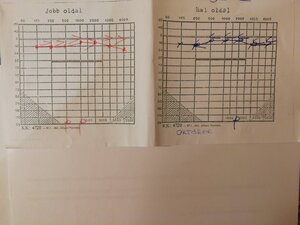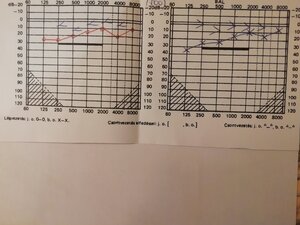- Oct 19, 2019
- 862
- Tinnitus Since
- 2016/2017/2019
- Cause of Tinnitus
- Unknown
Today I went to audiology the second time after having one test done in October. I dont think, or I just don't realize that my hearing has changed, but I got completely different results. My tinnitus did change from a unilateral low buzzing to a bilateral, very high frequency grinding sound. At some frequencies there is like a 25 db drop from the previous results.
Can it be caused by that the first audiogram was done in a silent room, and the second, most recent one in a normal room, just with the headphones on?
Bone conduction hearing seems to be alright, but the air conduction one is not good. I'm not aware that I have a cold or allergy. I'm pretty tired and anxious because I've been sleeping 2-3 hours for 4 months, but I'm not sure whether it would have an impact on the audiogram. I've been protecting my ears vigorously, but of course I bumped into some loud noises and a very noisy MRI, but those did not make my tinnitus permanently worse.
I also have some earwax on my eardrum on my worse ear, but ENT said nothing to be worried about. ENT also was not too concerned about my audiogram.
Can it be caused by that the first audiogram was done in a silent room, and the second, most recent one in a normal room, just with the headphones on?
Bone conduction hearing seems to be alright, but the air conduction one is not good. I'm not aware that I have a cold or allergy. I'm pretty tired and anxious because I've been sleeping 2-3 hours for 4 months, but I'm not sure whether it would have an impact on the audiogram. I've been protecting my ears vigorously, but of course I bumped into some loud noises and a very noisy MRI, but those did not make my tinnitus permanently worse.
I also have some earwax on my eardrum on my worse ear, but ENT said nothing to be worried about. ENT also was not too concerned about my audiogram.

 Member
Member


